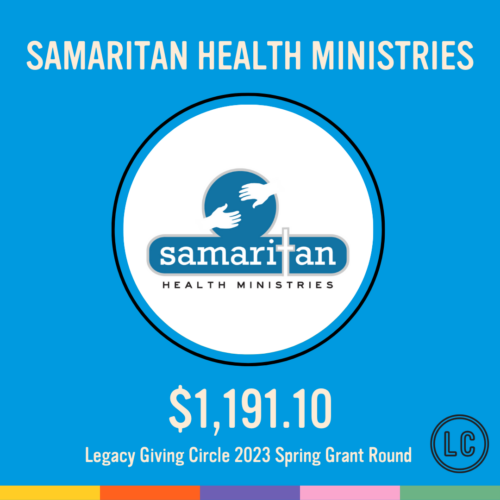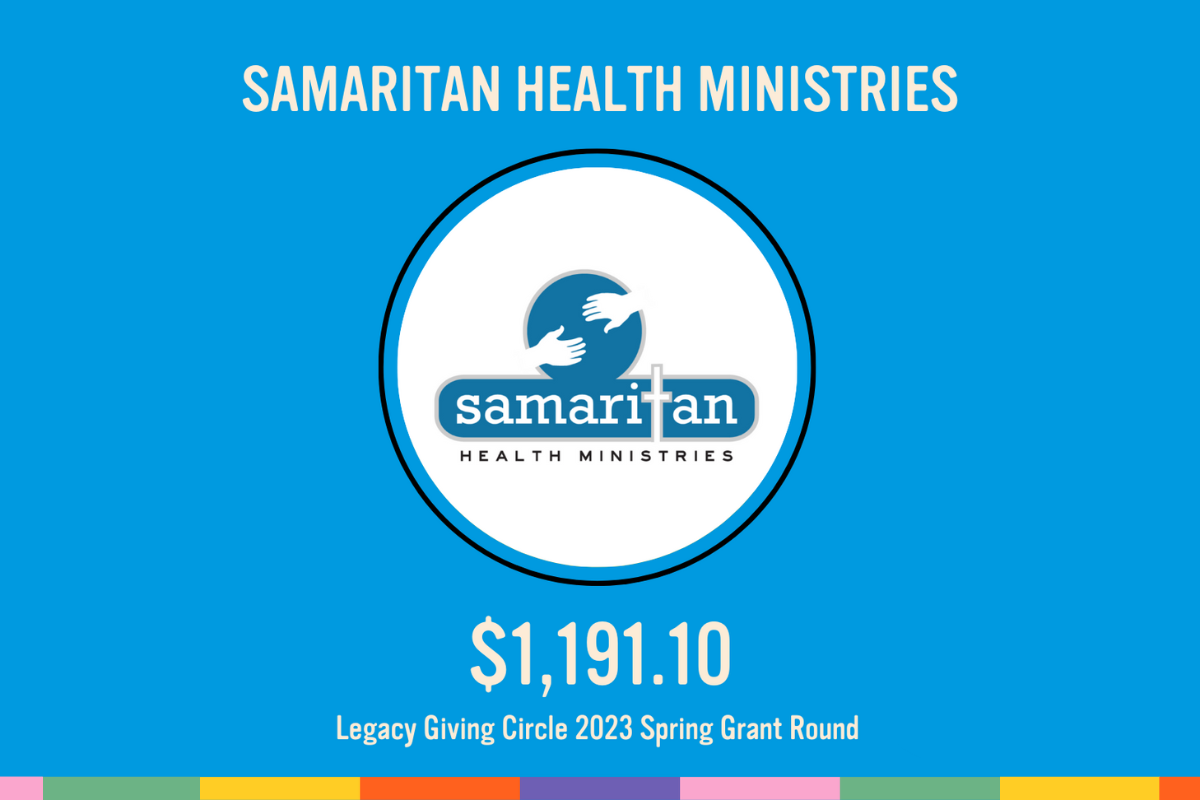
We are excited to announce our 10th and final 2023 Spring Grant Recipient!
Thanks to our generous Legacy Giving Circle donor community, Samaritan Health Ministries is receiving a $1,191.10 grant towards benefitting health equity for the working poor.
Initiative Location: Leander, TX
Initiative Cause Areas: Healthcare; Human Rights; Mental Health
UN Sustainable Development Goals: 03 Good Health & Well-Being; 10 Reduced Inequities
Initiative Description: Samaritan Health Ministries respectfully seeks a grant of $40,000 from the Legacy Collective to help pay a Nurse Practitioner with mental health expertise and a Psychiatric Pharmacy Technician with to meet a growing need for mental health assessment and treatment of our patients, who are among the working poor.
Our uninsured, low-income clients suffer from the same mental health issues that insured people do but have limited resources to get help. Since many of our patients are considered “essential workers” who are required to show up at their workplaces, they have additional stresses beyond those of people with higher incomes. Our patients’ physical medical conditions, including hypertension and heart disease, are exacerbated by chronic mental health problems. They are unlikely to have paid sick days, which means an illness or injury can be financially devastating. Funding for paid health professionals to supplement volunteer professionals at Samaritan Health Ministries is essential to meet the increased medical and mental health needs of our patients.
Rapid growth in Central Texas means that the number of uninsured people in our service area continues to grow. The U.S. Census Bureau reports that 18% of Texans do not have health insurance. The state’s decision not to expand Medicaid, which would provide health insurance to more people, means uninsured residents will continue having to choose between seeking treatment when they are sick or injured or going to their low-paying hourly jobs. In other words, they have to choose between getting treatment or paying rent or putting food on their tables.
The well-documented impact of the pandemic on mental health across our society drives the increased demand for affordable, quality mental health care. The physical conditions our doctors treat are exacerbated by chronic mental health problems and vice versa. Solving these by returning patients to healthier mental states is part of the holistic health care model we offer that works well.
Mental health professionals are important members of our primary care teams. They help patients deal with stress, depression, anxiety, grief and loss, chronic pain, and traumatic stress disorders. The addition of some paid, part-time mental health providers, such as a Nurse Practitioner with mental health expertise and Psychiatric Pharmacy Technician, to the SHM team expands our capacity to see and treat more patients by improving continuity of care as well as helping with recruiting and retention of volunteer medical professionals. This results in better outcomes for patients because they are healthier employees, family members and breadwinners.
Those patients are diverted from emergency rooms because they get timely and appropriate treatment before their health deteriorates to the point that they seek more expensive and extensive treatment in emergency rooms. Our care not only reduces visits to emergency rooms, it also reduces the amount of time in recovery. Overall better health among the uninsured reduces the financial burden on hospitals and taxpayers who would have to pay for that higher level of care.
For over 25 years, Samaritan Health Ministries has been a “safety net clinic.” We care for the working poor, people who make too much money to qualify for Medicaid and too little to afford insurance on the American Cares Act exchange. Our clients earn less than 250% of the Federal Poverty Level (FPL), which is calculated based on household size. Most earn far less than that. Our patient demographics indicate 74% are non-white and 66% are women.
Founded in 1998 as a grassroots effort to address the growing number of people who were uninsured, SHM uses a volunteer-based, paid-staff hybrid to stretch medical health dollars. While we use paid staff for continuity of care, we rely on volunteers to provide significant cost savings as well as loving health care. We provide non-emergency primary medical, women’s health, and mental health care, and pharmacy services to more than 1,000 uninsured families in Williamson and Travis Counties. In addition, we offer education on diseases and medications plus nutrition, exercise and lifestyle counseling.
SHM serves all uninsured, non-pediatric patients who come to us without regard to age, disability, ethnicity, income level, gender, political affiliation, race, religion, or other cultural or social condition.
Patients pay based on income and family size. Fees are $12 – $45 per visit. Medications and lab work are provided at no additional cost to the patient. Most patients pay only $12 per visit, which includes a diagnostic workup and assessment of target symptoms, labs, imaging, and medications. Patients are not required to pay if they cannot afford the fees. SHM has a strong referral network that allows us to obtain additional services for patients in the form of in-kind and discounted services from our community partners.
We are currently open five days a week from 8 am until 4 pm and want to expand our services back to pre pandemic levels. This grant would open the possibilities of staying open later and even adding an occasional Saturday.
In 2022, we served 1,443 unduplicated patients with 4,854 visits plus 7,147 pharmacy refills valued at more than $920,000. SHM remained open throughout the COVID-19 pandemic serving our patients in face-to-face and telehealth appointments.
In 2022, SHM served as follows:
- Primary medical care = 2,767 visits
- Mental health = 280 visits
- Women’s health = 327 visits
- Dental care = 1,429 visits
- Nutrition = 51 visits
- Mammograms = 71
- Prescriptions = 7,147
- Covid-19 vaccinations = 62
- Flu vaccinations = 229
- Volunteer hours (at clinic) = 2,304
Initiative Impact: SHM treats some of the sickest residents of Central Texas. Our patients often have multiple diagnoses, such as diabetes and hypertension. We offer medical, mental, and women’s health care; pharmaceutical services, and wellness and nutrition counseling and education in our one-stop shop. Thus, we remove barriers to quality health care for people who are limited in time and transportation. Our patients are able to schedule and keep appointments without having to go to multiple locations for each form of care. Medical professionals benefit from having seamless access to diagnoses, treatment, and monitoring of their patients.
Patients are usually scheduled for 30- to 60-minute visits depending on the complexity of their cases. Extended appointment periods allow providers to get to know patients in depth so they can address issues that may complicate their overall health. We strive to provide a friendly, supportive environment that feels like a medical home to our patients. That is why former and current patients are some of our best ambassadors to the community.
We have extensive follow-up with our patients to ensure they are following their treatment plans and to discern if an issue arises that affects their health and needs to be addressed. Besides clinic visits, patients receive one-on one nutrition counseling as part of their diabetes management and instructions on using a glucometer and blood pressure cuffs for home monitoring. This allows our clinical staff to monitor glucose levels closely, discuss lab results, and help patients understand their diseases and treatments. If patients have to be hospitalized, our staff keeps or stays in touch during and after hospitalizations and provides assistance.
By these means, we achieve great rapport and maintain trust with patients. This yields increased compliance for treatment which, in turn, provides better clinical outcomes, e.g., glucose and HgA1C levels. Our patients appreciate and benefit from this extra attention.
The net result is healthy patients who are better employees, family members and contributors to society. Staying healthy means they do not burden taxpayers by going to emergency rooms for care when their illnesses become dire and require more extensive and expensive care. Healthier patients are more likely to break a cycle of poverty.
Our volunteer-based and staff-supplemented model of health care yields patient outcomes often superior to those clinics utilizing only paid staff, but at a fraction of the cost. For example, we have seen steady progress in most of our patients who are managing diseases. More than 77% of our diabetic patients are successfully managing their disease (HbA1C < 9) and more than 72% of our hypertension patients are in good control (BP < 140/90)
Initiative Sustainability: In addition to patient contributions, which are assessed on a sliding scale but not required if a patient is unable to pay, SHM continues to diversify its revenues streams with more grants, individual and corporate donations, and fundraisers to sustain the important operations of our clinic. Our new volunteer coordinator is tasked with recruiting more volunteer medical professionals to help keep our patient care expenses down.
SHM is blessed to have robust partnerships with medical and medical-related providers which allow us to offer free and discounted services so the ability to pay does not become a barrier to receiving health care. We continue to seek new providers to partner with and offer affordable care.
